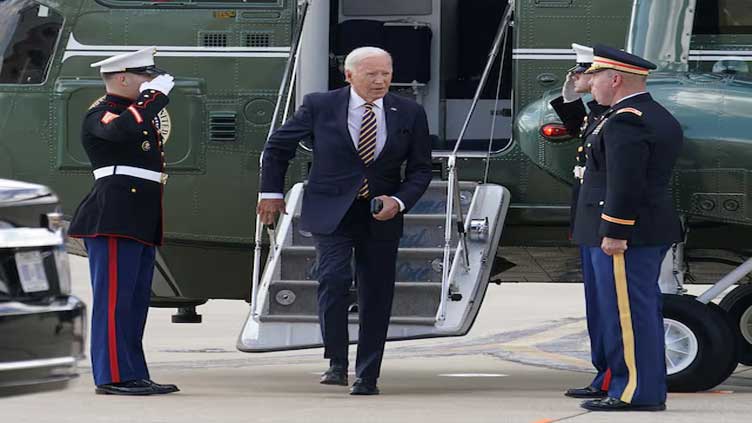Quad to expand maritime security cooperation at Biden's farewell summit

World
Quad to expand maritime security cooperation at Biden's farewell summit
WILMINGTON (Reuters) - Leaders of Australia, India, Japan and the United States will announce plans for new security initiatives in the Indian Ocean on Saturday when outgoing US President Joe Biden hosts counterparts from the Quad grouping established due to shared concerns about China.
Biden will welcome Australian Prime Minister Anthony Albanese, Indian Prime Minister Narendra Modi, and Japanese Prime Minister Fumio Kishida for a four-way meeting near his hometown of Wilmington to stress the importance of maintaining the Quad, which he sees as a signature foreign policy achievement before he leaves office after the Nov. 5 US presidential election.
The leaders will announce a plan for joint coast guard operations that will see Australian, Japanese and Indian personnel spend time on a US coast guard vessel. The countries will also announce plans for increased military logistics cooperation, the officials said.
They said the leaders will step up work to provide critical and security technologies, including a new open radio access network, to the Pacific Islands and Southeast Asia, regions of intense competition with China, Washington's main strategic competitor.
A health initiative will highlight cooperation in combating cervical cancer, the officials said.
Analysts said the expected outcomes would mostly build on work that has already been done within the Quad, which Biden elevated to summit level in 2021. Saturday's meeting will be Quad's sixth leader meeting.
More than 100 people are dead or missing in Mexico's western Sinaloa state since rival factions of the Sinaloa cartel began clashing on September 9th with the gruesome violence.
Analysts said new maritime security initiatives at a time when China is stepping up pressure on its territorial rivals in the South and East China Seas would send a message to Beijing.
They said it would also represent a further shift of emphasis of the Quad's activities to security issues, reflecting growing concerns about China's intentions.
Lisa Curtis, an Asia policy expert at the Center for a New American Security, who previously worked at the White House, CIA, and State Department, said India, which is not part of any military alliance, has been worried about perceptions that the Quad could be militarizing the Indo-Pacific.
"But I think China's recent maritime aggression could be changing the equation for India and could be prompting India to become a bit more open to the idea of Quad security cooperation," she said.
Analysts and officials say Biden hosting the Quad is part of efforts to institutionalize the body ahead of his departure from office and that of Kishida, who is stepping down after a leadership contest next week and elections in Australia by next year.
"We're expecting this Quad summit ...to demonstrate the Quad partners are more strategically aligned than they have ever been, that they remain committed to putting real resources behind this effort to provide public goods for the Indo-Pacific, and most importantly, that the Quad is here to stay," a senior US official said.
The official noted that the Quad met at the foreign minister level under the previous administration of Donald Trump, who is running against Vice President Kamala Harris in November, and enjoyed bipartisan support, as reflected by the formation of a congressional Quad Caucus ahead of the summit.
Albanese told reporters on Thursday Canberra and Washington share concerns about China's security ambitions in Pacific Islands countries where Beijing is seeking a growing policing role. "We'll be discussing ways in which we can provide further support in the region to developing nations, including the action that we're taking together on climate change and supporting their energy security," he said.


